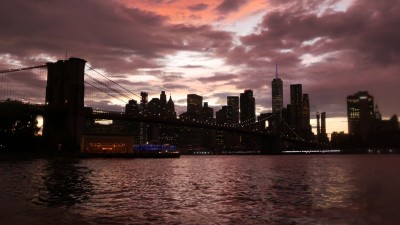
Cuomo Concedes To Mamdani, And Darkness Descends On NY
It happened with barely a whisper. On a humid June night in Manhattan, Andrew Cuomo—the once indomitable governor, a familiar ally to many of New York’s Jewish communities—stepped away from the stage. “He deserved it. He won,” Cuomo said of Assemblyman Zohran Mamdani, whose ascendant campaign has upended the city’s political foundation.
With that quiet concession, a pall settled over New York—a sense of a door closing, not just on a political figure, but on an era of clarity and moral grounding. And what has emerged in its place is a new, unfamiliar darkness—one that is quickly deepening.
Zohran Mamdani’s victory is being celebrated by progressive activists across the boroughs. But for Orthodox Jews in Queens—already grappling with a sharp rise in antisemitic hate, shaken by the events of October 7, and increasingly isolated in public discourse—this moment is nothing short of chilling.
Mamdani, who refused to condemn the rallying cry “globalize the intifada,” and who once openly supported the BDS movement, now stands on the threshold of real executive power. His rise has coincided with a campaign that used the trauma of Jewish victims to solicit votes—text messages invoking hostages and survivors of Hamas attacks, weaponizing pain for political gain. No apology. No shame.
We are told this is the future. But it feels more like a descent.
Last year alone, New York City recorded over 345 antisemitic incidents—the highest on record. Queens has seen mezuzahs ripped from doors, swastikas scrawled in public parks, Jewish students chased off college campuses. And now, the man who may soon lead this city is unwilling to distance himself from slogans and movements that so many of us view as existential threats.
Cuomo was far from perfect. But he never wavered on his support for Israel. He never hesitated to walk into our yeshivos, to fund security for our synagogues, to call out hate when it wore the mask of “activism.” With his departure, the center collapses—and the fringes rush in to take control.
That leaves Mayor Eric Adams as perhaps the last remaining barrier between our community and a leadership utterly indifferent to our fears. His administration has not been without controversy, but Adams has stood with our neighborhoods when it mattered most—deploying NYPD resources, affirming the IHRA definition of antisemitism, attending our events, and condemning terror without euphemism.
Now, with Cuomo gone and Mamdani gaining momentum, Adams’s continued leadership may be the only flicker of light in a city that is dimming before our eyes.
This is not political disappointment. It is spiritual exhaustion.
The streets of New York—once filled with pride, confidence, and Jewish visibility—feel colder. Less safe. Less welcoming. We are retreating inward, huddling close to our schools, our shuls, our block associations. We are holding our children’s hands tighter on the walk home. We are watching the news with dread, not curiosity.
And the question looms: Who will speak for us now?
If this election has taught us anything, it’s that being quiet is no longer an option. We must demand more. From Mayor Adams. From those around Mamdani. From every candidate who seeks our vote. This is not about politics—it’s about survival.
The darkness has come. Whether it lifts will depend on how loudly and how fearlessly we cry out.
By Shabsie Saphirstein
A City In Shadows
Typography
- Smaller Small Medium Big Bigger
- Default Helvetica Segoe Georgia Times
- Reading Mode




